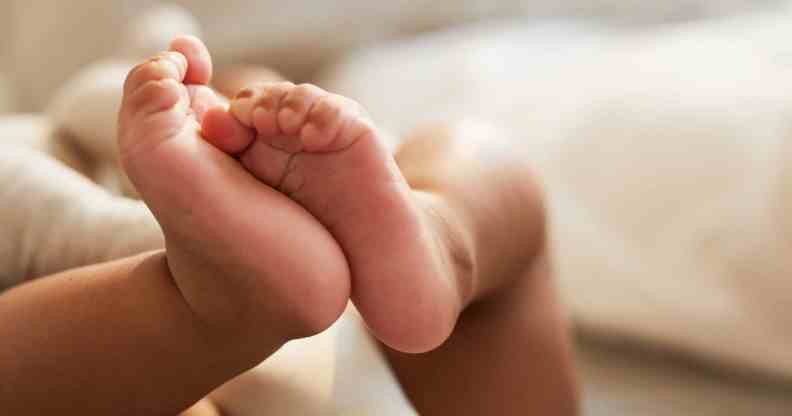Family loses bid to have gay dad named on birth certificate instead of surrogate’s husband

Stock photo of a baby. (Envato)
A lawsuit filed on behalf of the six-year-old daughter of a same-sex male couple, born via a surrogate mother, to have her biological father named on her birth certificate has been ruled inadmissible.
The case, which went to the European Court of Human Rights, involved the girl’s dads, one of whom is the biological father, the surrogate who birthed her along with her husband, and an anonymous egg donor.
The girl lives with her biological father, known to the court as A, and his partner, known as B.
In 2015, A and B entered a surrogacy agreement with a married straight couple – known as C and D.
The woman consequently became pregnant using an egg from an anonymous donor, and sperm from A. The girl, H, was born in 2016.
Before the girl was born, however, there was a breakdown in the relationship between the couples which complicated the legal rights to parenthood of the child.
In December 2016, a family court judge ordered that both couples should have parental responsibility for the child.
Sections 35 and 28 of UK’s Human Fertilisation and Embryology Act (HEFA) states that the surrogate mother (C) and her husband (D) are the girl’s mother and father, and that if A and B wished to be her legal parents, they would have to apply for a parental order, and re-register her birth.
This can only be done, however, with consent from the surrogate mother and the biological father. In this case, C and D did not consent to the biological father (A) being recognised as parent, and his case to be named on her birth certificate was struck down.
The case was taken to the High Court in 2019. It was argued that the child’s rights to private and family life, under Article 8 of the Convention of Human Right, were being breached by sections 35 and 38 of the HEFA.
The Court of Appeal refused to hear an appeal, after which an application was made to the European Court of Human Rights (ECtHR). However, on Wednesday (23 June), the court ruled the claim inadmissible because domestic remedies remained an option.
Dr S Chelvan, head of immigration and public law at 33 Bedford Row Chambers, representing the child, responded: “We are clearly disappointed with the result for H, who will now have to live with a birth certificate inaccurately recording who her actual father is.
“Ironically, this decision places clear weight and importance on the sovereignty of the UK parliament by the Strasbourg Court – a position clearly in conflict with this government’s drive to push through the Bill of Rights.”
Colin Rogerson, partner at law firm BLM, who also represented H, added: “Although we are very disappointed with this outcome, the Court has highlighted the issues that will need to be grappled by the Law Commission with its report.
“The Strasbourg Court in this decision has been very clear that it is left to the UK parliament to make its own laws and policies in relation to surrogacy and parentage.
“I very much hope the Law Commissions that is currently reviewing making recommendations for surrogacy law reform will place the right to a child to their identity as a key issue to be protected.”
The girl now lives with A and B, although she has continued to have a relationship with C and D, as well as their extended family.

